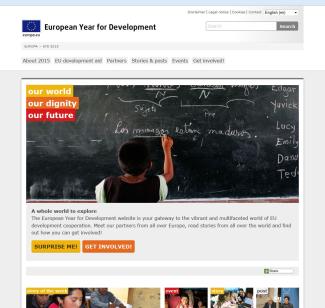European Year for Development
A special year

The European Commission lists several core messages, including the following:
- EU aid focuses on the countries which need it most.
- To prevent fraud and corruption, EU aid is regularly audited and controlled.
- Developing countries have a strong say in how EU aid is spent, what will be done and where.
- The EU involves civil-society organisations when it plans its cooperation with partner countries.
- EU humanitarian aid and development cooperation are different but work hand in hand.
- Europeans believe that we have a responsibility to help people in poor countries, and many are ready to play their part in this.
Indeed, a survey showed in 2013, that more than 80 % of Europeans consider development aid important, with 60 % thinking the EU and its members should spend more money on official development assistance (ODA). While two thirds said that tackling poverty in developing countries should be a main priority for the EU, half of the respondents stated that they did not know where EU aid goes.
In Germany, the European Year for Development was officially launched in Berlin on 20 February by Thomas Silberhorn, a parliamentary state secretary at the Federal Ministry for Economic Cooperation and Development (BMZ), and Marcus Comaro, the European Commission’s deputy director general for international cooperation and development. Various civil-society organisations took part in the event.
Engagement Global has been assigned to host the European Year’s national office on behalf of BMZ. The mandate goes far beyond doing PR work. The main idea is to get citizens actively involved. It is therefore essential to reach out to civil society, which is Engagement Global’s core mission. Non-governmental organisations that host events or run campaigns in the context of the European Year can apply for funding. The EU makes up to € 50,000 available per applicant. However, Engagement Global has already received so many applications in Germany that additional ones are no longer accepted. In every member country, the national government has assigned an agency to manage these matters.
The decision to make 2015 the Year for Development was taken in 2014. It is no coincidence, of course, that 2015 is also the deadline for the Millennium Development Goals as well as the year, in which the UN is setting the follow-up agenda, the Sustainable Development Goals. The European Commission, the European Parliament and the governments of the member nations want to involve the people in this important matter.
The BMZ’s charter for the future, which was launched in November after extensive consultations with civil-society, serves a similar purpose. As the EU, Germany’s Federal Government emphasises that ODA must not be seen in isolation but has links to many other policy fields, such as trade, security or environmental protection. So policy coherence is essential. (dem)
Links:
EU: European Year for Development (in 23 languages of member countries).
https://europa.eu/eyd2015
Engagement Global – Europäisches Jahr für Entwicklung (in German).
http://ej2015.engagement-global.de/
Charter for the Future: ONEWORLD – Our responsibility.
https://www.zukunftscharta.de/ecm-politik/zukunftscharta/de/home/news/single/id/1075







